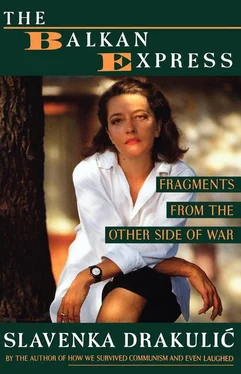Slavenka Drakulić - The Balkan Express - Fragments from the Other Side of War
Здесь есть возможность читать онлайн «Slavenka Drakulić - The Balkan Express - Fragments from the Other Side of War» весь текст электронной книги совершенно бесплатно (целиком полную версию без сокращений). В некоторых случаях можно слушать аудио, скачать через торрент в формате fb2 и присутствует краткое содержание. Город: New York, Год выпуска: 1993, ISBN: 1993, Издательство: W. W. Norton & Company, Жанр: Биографии и Мемуары, Публицистика, на английском языке. Описание произведения, (предисловие) а так же отзывы посетителей доступны на портале библиотеки ЛибКат.
- Название:The Balkan Express: Fragments from the Other Side of War
- Автор:
- Издательство:W. W. Norton & Company
- Жанр:
- Год:1993
- Город:New York
- ISBN:0-393-03496-8
- Рейтинг книги:4 / 5. Голосов: 1
-
Избранное:Добавить в избранное
- Отзывы:
-
Ваша оценка:
- 80
- 1
- 2
- 3
- 4
- 5
The Balkan Express: Fragments from the Other Side of War: краткое содержание, описание и аннотация
Предлагаем к чтению аннотацию, описание, краткое содержание или предисловие (зависит от того, что написал сам автор книги «The Balkan Express: Fragments from the Other Side of War»). Если вы не нашли необходимую информацию о книге — напишите в комментариях, мы постараемся отыскать её.
The Balkan Express: Fragments from the Other Side of War — читать онлайн бесплатно полную книгу (весь текст) целиком
Ниже представлен текст книги, разбитый по страницам. Система сохранения места последней прочитанной страницы, позволяет с удобством читать онлайн бесплатно книгу «The Balkan Express: Fragments from the Other Side of War», без необходимости каждый раз заново искать на чём Вы остановились. Поставьте закладку, и сможете в любой момент перейти на страницу, на которой закончили чтение.
Интервал:
Закладка:
Ana – although of course this is not her real name – is twenty-six years old and already an accomplished young journalist. She started to write while still at high school. In a way, she was forced to support herself. Once she told me that she was from a poor farming family, from a village about forty miles from Zagreb. When she came here to secondary school, her parents didn’t have money to pay for her schooling in a big city, so seeing no future for herself in the place where she was born, she had to find a way to survive in Zagreb. She started to write for a youth magazine. Modest as she was, she needed only a little money and that was an ideal place to earn it and to learn a profession too. Curiously – curious, that is, only in the light of what she did later – she was interested above all in writing about social issues. It was a very unpopular subject among young reporters who preferred to hang around the city and have fun. If they had a sharp tongue, and could write with wit and humour about movies, books, the theatre or culture in general, they even stood a good chance of making a name.
This is why Ana’s choice was unusual and welcomed by the editorial board of permanent ‘students’ in their thirties who were only waiting to grab an opportunity to start work on a ‘big’, real paper. On the other hand, for anyone who knew her it wasn’t such a strange choice. The first thing that struck you about Ana was her seriousness. Perhaps that’s why she gave an impression of being older than she was. Even if her face framed with limp blonde hair looked childish, its expression was tense and stern and her whole attitude quiet and withdrawn. If she lacked one thing, it was a sense of humour. One always had the feeling that Ana was very dutiful – towards her parents, at school (she was an excellent student), at her job. If her writing lacked style, she compensated for it with accuracy and reliability and she had a feeling for a good story as well. I remember her articles on tramps, beggars, prostitutes, public kitchens and numerous other social injustices that the communist government would have preferred to brush under the carpet. However, the overall impression was that of diligence, of the dutiful pupil.
As soon as she finished her journalistic studies at the faculty of political sciences she started to free-lance for a big political weekly and soon became a staff writer following the same kind of stories there. She was the youngest member of staff and everyone liked her. This was when I came to know her better. I even considered her something of my own ‘child’, someone I especially cared about. I was impressed by the fact that she, only two years older than my daughter, was working for a serious magazine. The other thing that struck me about her was that she had supported herself all through her school and university years.
One day Ana came to me crying. I’d never seen her in that state, usually she was able to control herself and to handle her problems without help. But this time she was desperate: she had to leave a rented apartment she lived in and didn’t have anywhere to move to. It was the beginning of the school year in 1990 and the city was full of students searching for apartments, the worst possible time to be thrown out. By coincidence, my friend – let’s call her Marta – had just moved out of her apartment to join her husband in Belgrade. Although she could have got good money renting it to a foreign businessman for example, she didn’t want to let it but instead was looking for someone to stay there to take care of her valuable collection of paintings. When she asked me if I could recommend someone I told her about Ana. In my view, she was an ideal candidate, young, responsible and without money. I put them in touch and Marta was happy to entrust her apartment to her. Suddenly relieved of the need to search further and with the prospect of staying there for a couple of years at least, Ana was overjoyed.
In the following months the situation on our magazine changed considerably for the worse and Ana left for what she thought would be a better paid job in a new daily newspaper which went down after just two months of publishing. Shortly afterwards, she started to work for another new magazine, a sensational political tabloid, a particular kind of publication characteristic of all ex-communist countries after 1989. I would never have thought she would have been willing to work for such a paper, but I didn’t want to blame her too much because, to tell the truth, there was not much choice.
In the meantime, war had broken out in Croatia and I spoke to her a few times on the telephone. She sounded saturated with emotion, confused and unable to analyse the new political situation, succumbing more and more to the phenomenon of total national homogenization. It was not hard for this to happen to her because, like the rest of her generation, she was not only completely depoliticized (which actually meant a refusal to discuss or understand politics, as a form of rebellion against the then apparently immutable communist regime) but also lacked the education, the intellectual means for analysis of this kind.
During that time Marta was commuting between the two cities of Belgrade, where her husband lived, and Zagreb where she was a professor at the university. When in Zagreb, she stayed in her brother’s apartment. Her brother was a diplomat in one of the African countries, diplomacy happening to be a family tradition. Their late father, a well-known and highly placed party leader in post-war Yugoslavia, served first in the government and then as ambassador to many countries in the West; as a result Marta had spent half her life in Berlin, Rome, Paris, Geneva and so on. In fact, she had never lived for a long period of time either in Zagreb or anywhere else in her own country. She was more of a cosmopolitan orientation, spoke at least four languages fluently and had a lot of excellent connections abroad – a common curriculum vitae for the children of the ‘red bourgeoisie’. There is no doubt that she – as opposed to Ana – was a member of Yugoslavia’s communist elite and so she never suffered from any lack of apartments, foreign travel, books or the company of interesting people. After all, she herself was a philosopher and the author of a number of books, in short a respected intellectual in her own right.
When the war approached Zagreb with the air-raid alarms of mid-September 1991, she wrote about her experiences for Belgrade’s leading liberal opposition paper. Describing the atmosphere of growing fear, suspicion and danger, she wrote:
This is such a narrowing of the human horizon as I could never have imagined before. A person is reduced to one dimension only, that of the nation; a culture is reduced to limited and hastily invented national symbols; we all become shortsighted. They have enclosed us within narrow borders we never knew existed and now we are culturally suffocating – not to mention the physical suffering of countless dead and wounded. We are all going to choke like mice. We are never going to get out of this nationalist discourse, Croatian or Serbian alike. We’ll never be able to build our future on that, we’ll be thrown back perpetually into the past, far back into the past.
She goes on to describe her neighbours turning into self-appointed policemen, dirty cellars sheltering people far too ready to collaborate with the war, the way one becomes an enemy. She concludes:
This is not my state and my city. I wasn’t born here.
The reaction to her article was as vehement as it was unexpected. It wasn’t the fact that she wrote for a magazine in what was already the enemy state of Serbia, because it was well known for taking a pro-Croatian position anyway. It was more that it was a clear sign that she’d gone ‘too far’ in expressing her individualism, her unwillingness to participate in what she called ‘war games’. However, she had chosen perhaps the most unhappy moment of the war in Croatia: Osijek was being shelled every day, Vukovar had been surrounded and was systematically being destroyed, the blockade of Dubrovnik had just begun, many Croat villages had been burned down and a river of hundreds of thousands of refugees from the occupied territory was flooding Zagreb. Young boys, her students, were getting killed. Yet she had written of feeling imprisoned in the city, as if it were a jail , as if she were displeased with what was going on.
Читать дальшеИнтервал:
Закладка:
Похожие книги на «The Balkan Express: Fragments from the Other Side of War»
Представляем Вашему вниманию похожие книги на «The Balkan Express: Fragments from the Other Side of War» списком для выбора. Мы отобрали схожую по названию и смыслу литературу в надежде предоставить читателям больше вариантов отыскать новые, интересные, ещё непрочитанные произведения.
Обсуждение, отзывы о книге «The Balkan Express: Fragments from the Other Side of War» и просто собственные мнения читателей. Оставьте ваши комментарии, напишите, что Вы думаете о произведении, его смысле или главных героях. Укажите что конкретно понравилось, а что нет, и почему Вы так считаете.












